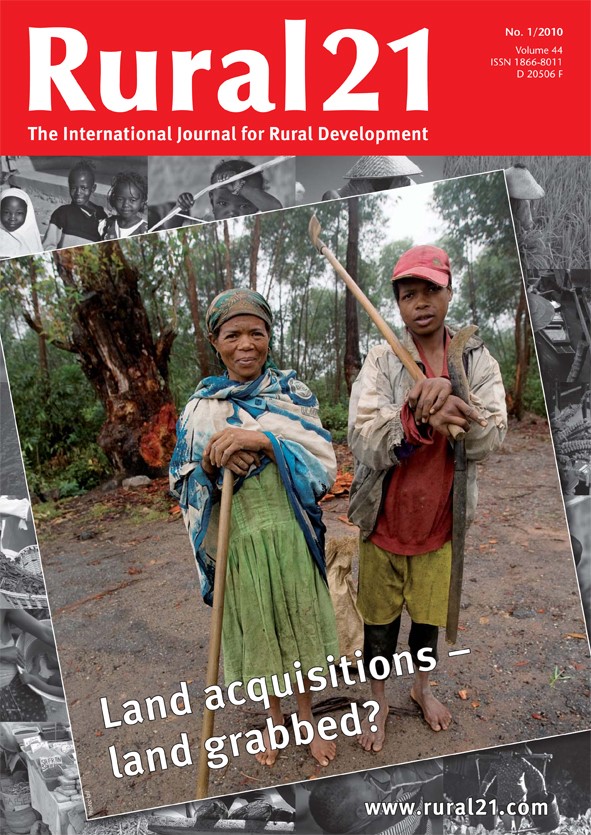Location
The international journal Rural 21 has dedicated more than 40 years to all topics surrounding rural development. Its ambition is to further those strategies and policies that strengthen rural areas of developing and newly industrialising countries and encourage their implementation. The journal addresses the complete range of relevant themes – from agriculture and fisheries via capacity building and education through to health and social security, energy supply and trade. Center-stage is always devoted to inquiring into how measures and strategies can contribute to global food security and to reducing poverty.
Rural 21 desires to further the dialogue between science and politics, the private sector, civil society and practitioners. Two platforms are designed for this purpose: Rural 21 in print is published four times a year, each issue highlighting a specific focus of rural development – this print edition is read in more than 150 countries. In parallel, Rural 21 online keeps the rural development community up to date on news and events, scientific findings and other print and online publications.
Rural 21 is published by DLG-Verlag GmbH in Frankfurt/Germany. Financial partners are BMZ (German Federal Ministry for Economic Cooperation and Development), GIZ (Deutsche Gesellschaft für Internationale Zusammenarbeit), DLG (German Agricultural Society – Deutsche Landwirtschaft-Gesellschaft), SDC (Swiss Agency for Development and Cooperation) and Helvetas Swiss Intercooperation.
The first issue of Rural 21 dates back to 1968. From 1974 to 2007, the journal was published in three languages entitled "entwicklung & ländlicher raum" / "agriculture & rural development" / "agriculture & développement rural". In 2008, the journal was relaunched as "Rural 21".
Members:
Resources
Displaying 236 - 240 of 319Cheese versus poverty
Smallholder communities in the Bolivian highlands have managed to conquer hunger: cheese production o? ers great hope to the people of the Peñas Valley. Cheese provides healthy nourishment for their children, generates additional income for families, and stimulates the local economy. Education is a decisive factor.
"Land grabs" in Africa: Pathways, trends and the role of legal contracts
Large land acquisitions can have a deep, lasting e? ect on livelihoods, food security and the future of agriculture, so there is a need for strategic thinking, vigorous public debate and government responsiveness to public concerns, especially in recipient countries
Rethinking rural and agricultural finance - The African case
In order to boost agricultural growth in SSA, further investment in the agricultural sector is urgently needed. The mark-up of ODA funds is a stepping-stone in this regard. However, ODA should function as a catalyst for further private investments and should be used to assist recipient governments in building the institutional framework for attracting private investment and promoting balanced growth. Important success factors include further advances in improving domestic banking and agricultural risk management systems.
Integrated Watershed Management
Water and soils are increasingly becoming a limiting resource for meeting the food requirements
of a growing world population. Integrated concepts for managing natural resources in a sustainable
and environmentally sound manner show encouraging impacts, if applied on a large scale and
over a long period like in Tigray, the northernmost regional state of Ethiopia.
Development policy and security policy: An alliance with conflict (management) potential
In Germany, the debate about the security/development nexus is gathering pace. The reality of life in crisis regions, the management of post-conflict situations and the precautionary anticipation of demands arising in the context of crisis management all require the highest level of coordination at political and local level and on a cross-sectoral basis. Long-term improvement of this coordination, both vertical and horizontal, is the most important resource factor for these two policy areas and can be achieved without mobilising additional budget funds.



